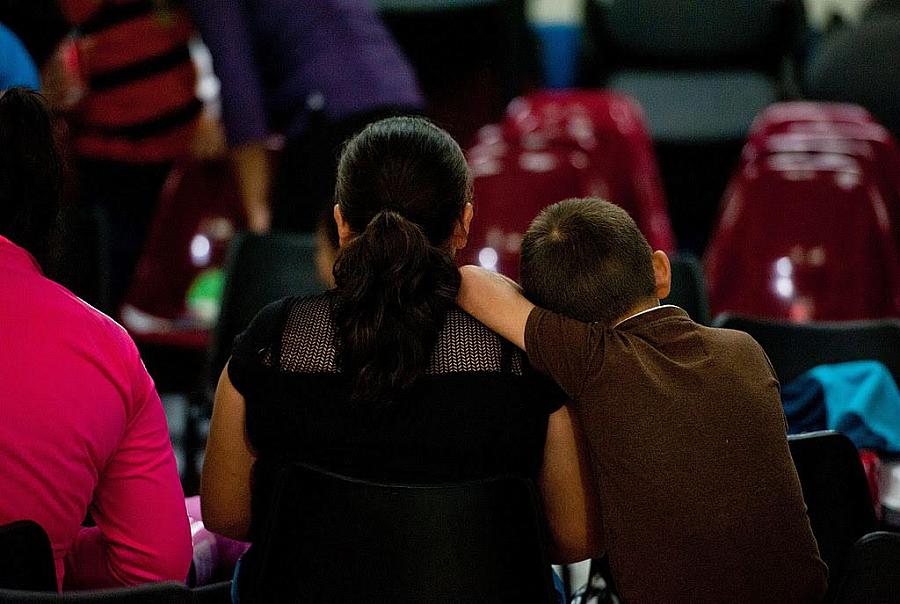After witnessing horrific violence, a young immigrant is plagued by nightmares

Photo: Jose Cabezas/Getty Images
Carlos, my chubby 10-year-old patient with deep brown eyes and an uncertain smile, crossed the U.S.-Mexico border with his mom about three months ago. They were forced to flee their home in Central America after the local gang attempted to recruit Carlos. If he didn’t join, the gang told him they would kill him.
Carlos believed them because he had already watched them slaughter a man to death with a machete. Carlos says he can’t sleep because bloody bodies chase him through his dreams. He wakes screaming so intensely that he startles the neighbors. After a lifetime of exposure to domestic violence — Carlos’ mother says his dad would beat her — the gang’s threat to Carlos was the breaking point. His mom moved them to Los Angeles with little more than hope for safety.
Children such as Carlos who have witnessed violence and are living in fear have suffered what researchers call adverse childhood experiences (ACEs). Such traumatic events can impact children’s health for the rest of their lives.
The Centers for Disease Control and Prevention (CDC) and Kaiser Permanente conducted the original landmark ACEs study in the 1990s. The researchers surveyed more than 17,000 Southern California Kaiser HMO members who had come in for routine physical exams. Participants were asked about hardships that occurred before they turned 18 and also about their current health status and behaviors.
Adverse childhood experiences include emotional, physical and sexual abuse, neglect, household disruption — such as divorcing parents or living with someone sent to prison — exposure to violence, an alcoholic or drug-addicted parent, and so on. Nearly two-thirds of the respondents, regardless of socioeconomic status, race, sex or education, reported one or more adverse experience in the original Kaiser survey.
Participants who have experienced a greater number of ACEs were more likely to have significant health problems, such as depression, alcohol or drug abuse and domestic violence, among others. Higher ACE scores also correlated with higher risk for physical ailments, including heart disease, lung disorders, liver problems, and even early death.
More recent research has shown why such early experiences can inflict such long-lasting harm. Traumatic events trigger the body’s stress hormones, including cortisol and adrenaline. These chemicals trigger the “fight or flight” instinct the body uses to respond to danger. The heartbeat quickens and energy surges so a person can defend himself or run for safety. A little stress in childhood helps develop coping skills, but chronic elevation of the stress hormones is caustic. Such “toxic stress” undermines a child’s sense of safety and well-being, and their stress response system becomes stuck in the “always on” mode.
For children, toxic stress can disrupt normal brain development by impairing the growth of neural circuits. That underdevelopment of the brain can in turn lead to problems in higher-order tasks such as learning, coping with adversity, and basic social skills.
Fortunately, the negative impacts of toxic stress can be lessened. Caring, responsive caregivers can buffer against the harmful effects. Attentive parents or caregivers can soothe a child and help them “reset” their stress levels. Communities can also make a difference by offering supportive programs and services. Access to quality mental and physical health care for children and their parents has proven beneficial.
Policy makers are increasingly aware of the need to address childhood adversity. This has led to changes in foster care systems, school programs and health care funding. For example, some foster care programs have incorporated trauma-informed parenting classes for foster parents and some school systems are adopting alternative discipline tactics for traumatized kids. Recently Sens. Dick Dubin (D-IL), Heidi Heitkamp (D-ND) and Al Franken (D-MN) introduced Trauma-Informed Care for Children and Families Act to improve funding for programs designed to identify trauma and provide care to affected children.
Such programs can’t come quickly enough for kids such as Carlos, who still suffers daily from anxiety and depression. In addition to the nightmares, he is hypervigilant about his environment and always scanning for threats, which distracts him from schoolwork. He seeks comfort in food and is overweight as a result, putting him at higher risk for diabetes, high blood pressure and heart disease.
But Carlos is one of the luckier ones. He is now in a safer neighborhood, making new friends and belongs to a supportive church community. In addition, he and his mother have access to health care and both are starting psychological therapy. His trauma will never go away, but at least now he has a chance to get the treatment he needs.
**

